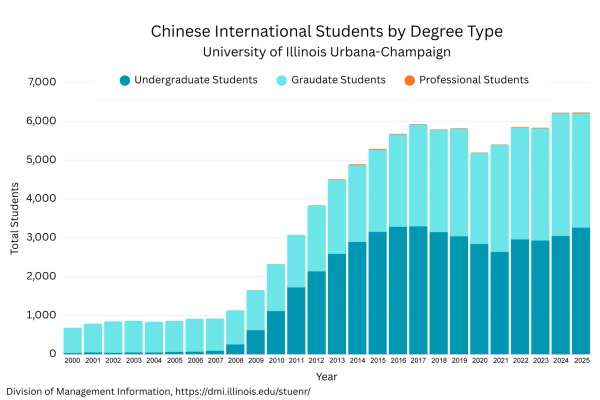Gov. Rauner’s budget plan to cut $209 million in University of Illinois funding
Feb 18, 2015
Last updated on May 10, 2016 at 09:39 p.m.
Governor Bruce Rauner presented his budget plan to the General Assembly on Wednesday, outlining major changes to education and pension funding, along with changes in Illinois’ tax code. Rauner announced major cuts to the state’s budget, which will mean cuts for the University.
“The budget outlined today is the budget Illinois can afford, and that in itself is an example of ‘thinking anew,’” Rauner said. “For far too long we have been living beyond our means — spending money that Illinois taxpayers could not afford.”
Under the budget proposal, state funding for higher education would decline by 31.5 percent, just over $387 million. The University faces massive cuts in state appropriations under the governor’s budget, which will amount to nearly $209 million.
“A budget cut of that magnitude would substantially harm our students and the people of Illinois by most severely impacting the University’s core education and research missions,” said President Robert Easter in a statement. “Between now and the end of the legislative session, the U of I will be in the Capitol to participate vigorously in this debate, stressing the twin aspects of prudent (and) responsible stewardship of public resources.”
Get The Daily Illini in your inbox!
University Spokesman Tom Hardy said the University had originally been directed by the Illinois Board of Higher Education to prepare a budget scenario in which the University would reduce its budget by 20 percent. The cuts put forward by the governor, Hardy said, greatly exceed what the University expected, and could affect everything from student services to faculty salaries to class sizes.
Among the more controversial proposals in Rauner’s speech was a restructuring of public employees’ pension system, advocating for moving thousands of employees, excluding firefighters and policemen, to a Tier 2 pension plan. Raune r said by making the switch, the state would save $2.2 billion in the first year and employees would still retain their benefits.
However, a Tier 2 pension plan will likely be challenged in Illinois’ courts, said Christopher Mooney, director of the Institute of Government and Public Affairs, as it would reduce the benefits of its employees, which would go against the state’s constitution.
State employees hired after 2011 would have the additional option of taking a “buyout,” meaning a lump sum payment and a defined contribution in lieu of a standard pension. In return, employees would take a voluntary reduction in the cost-of-living adjustments they would receive from the state.
“It’s time to empower our workforce and address one of the biggest fiscal challenges we face,” Rauner said.
Under his proposed budget, Rauner said, funding for K-12 education would increase by an estimated $300 million.
“It’s time to make education our top priority again — and that’s what this budget does,” Rauner said. “We start by increasing high-quality early childhood education options for our most vulnerable children.”
However, teachers’ union Illinois Federation of Teachers, said the plan is disingenuous and will not meet the recommended minimum level of funding they believe is necessary.
“Governor Rauner is painting a false picture of education funding,” said Aviva Bowen, Illinois Federation of Teachers spokeswoman, in a statement. “His proposal to ‘increase funding’ is achieved only by folding in line-item appropriations already in the State Board of Education’s budget.”
Rauner also proposed budget cuts to local city governments in his budget, which he said would amount to a 3 percent reduction in their overall budget. By halving the share of income tax revenue local governments receive from 8 to 4 percent, local governments would receive $600 million less in state appropriations in fiscal year 2016.
Under Rauner’s budget proposal, the Regional Transportation Authority would see a 4.4 percent cut to the level of appropriations it receives from the state.
Rauner’s budget would cut an estimated 1.5 billion from Medicaid, which provides healthcare to low-income households.
“For Medicaid, our budget reduces costs significantly while maintaining eligibility levels for most lower-income Illinoisans,” Rauner said.
Illinois Comptroller Leslie Munger, who was appointed by Rauner this year, hailed his budget as an important first step in solving Illinois’ budgetary crisis.
“Today Governor Rauner offered a much-needed comprehensive approach to our state’s budget and fiscal challenges,” Munger said in a statement. “For the last decade state government has consistently spent more than it took in, borrowed money that it didn’t have and ‘balanced’ the budget with accounting tricks. Today the consequences of those actions are coming due.”
Josh can be reached at [email protected].






